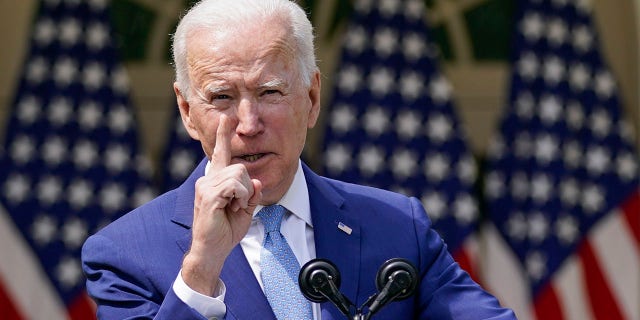The subsidies for child care in President Biden’s American Families Plan could have some unintended consequences for both families and child care businesses, including price increases, experts tell Fox News.
The American Families Plan is the third installment in three massive spending bills the president has proposed.
The $1.9 trillion American Rescue Plan, Biden’s coronavirus stimulus, has already passed. The $2 trillion-plus American Jobs Plan – billed by the White House as an infrastructure effort, though congressional Republicans say most of the spending is on other things – was proposed by Biden earlier this year. And he revealed the $1.8 trillion American Families Plan, which provides massive funding to new entitlements and other social spending, last week.
In that plan, Biden proposes spending $225 billion on child care generally, most notably capping the amount families that make up to 150% of the median income in their state will have to pay in child care at 7%.

President Biden speaks about gun violence prevention in the Rose Garden at the White House, Thursday, April 8, 2021, in Washington. Biden has proposed a massive $6 trillion in federal spending in three separate plans in his first 100 days. (AP Photo/Andrew Harnik)
WHAT’S IN BIDEN’S NEWEST $1.8T TAX AND SPENDING PLAN?
“President Biden’s American Families Plan will ensure low and middle-income families pay no more than 7 percent of their income on high-quality child care, saving the average family $14,800 per year on child care expenses,” the White House fact sheet on the plan says.
But some experts are raising concerns that by directly subsidizing families’ spending on child care, the government could end up raising costs in the long term in a way the subsidies might not be able to keep up with.
“The idea of using subsidies to essentially engineer some sort of outcome is not exactly a great idea. Any time you end up subsidizing something that represents a market manipulation,” Jonathan Bydlak of the R Street Institute told Fox News. “There’s always a potential, as we’ve seen in areas like education, for example, where… education costs are almost certainly higher as a result of the ways in which we subsidize that system.”
Many have argued that years of government subsidies for college have raised the spending power of the average person for higher education, but not necessarily to their benefit. Colleges and universities, those people say, have taken note of families’ increased spending power and raised their tuitions accordingly, resulting in the sky-high tuition rates that exist today.
The comparison between Biden’s child care subsidies and the massive subsidies for college tuition in the form of government grants and loans, Bydlak said, “is pretty similar and so is a reasonable one.”
WHAT BIDEN’S CAPITAL GAINS TAX PROPOSAL COULD MEAN FOR YOUR WALLET
Of government subsidies for child care, Bydlak said, “That ultimately will be a manipulation of the market, and market participants will end up responding to that and responding to those changed incentives.”
The subsidies may help families in the short term, Bydlak said, but “over the medium and long term” results could be “similar to what we’ve seen in the education space.”

Northeastern University in Boston, Mass. Northeastern is one of many colleges that charge over $50,000 in tuition, room and board per year. Many blame the increased cost of a college education on government subsidies.
(iStock)
Ryan Bourne of the Cato Institute told Fox News that such massive child care subsidies are “just the next step along in the kind of slow normalization of early-years care to children,” citing the experience of countries like the United Kingdom.
“You come in and you offer lots of subsidies and you still have to play around with prices to control the subsidies you’re giving. Then from the prices, you get unintended consequences. You get too little child care in certain places. You get providers not being able to increase wages for certain employees, which means they tend to attract lower-quality care. All of these effects feed through and create kind of dissatisfaction that the subsidies haven’t achieved all of their objectives,” Bourne said.
He added: “And then you get the demand for even more where we’ve seen in many other industries where governments have a heavy hand.”
Indeed, Sen. Elizabeth Warren, D-Mass., and other progressives had been pushing Biden to include a $700 billion investment in child care centers that would guarantee that low-income families had free child care, in addition to the 7% cap for middle-income families.
“The evidence on this stuff is really mixed and certainly doesn’t justify the confidence, saying that this is going to be transformative for the kids. That families are going to massively reduce their living costs. This is not a win-win-win. You know, there are really, really thorny tradeoffs in this stuff,” Bourne added.
Bydlak nevertheless said that making child care – an extremely expensive service in many places – more affordable is a laudable goal. The best way to help families, he said, might be to give them money that’s not earmarked to be spent a certain way. That could help people who are hurting financially while simultaneously avoiding messing with market incentives, he said.

A day care without children. Some are warning that President Biden’s proposed child care subsidies could increase the price of child care in the long run.
(iStock)
PROGRESSIVES THINK BIDEN’S LATEST $1.8T FAMILIES PLAN ISN’T BIG ENOUGH
“Within the last year, I think there was a strong case to be made for providing things like aid to individuals in the form of unrestricted checks that is not tied to any specific type of spending,” Bydlak said. “To the degree that you’re going to have a federal role you provide aid and let individuals decide how best to allocate it to their own personal financial situation.”
Byldak pointed to a proposal from Sen. Mitt Romney, R-Utah, as a possible solution to helping families with targeted, unrestricted aid.
Romney’s bill would give families a $350-per-month benefit for each child under 6 years old and a $250-per-month benefit for children 6 to 17 years old.
“This is why, for example, why many people are more supportive of the earned income tax credit despite the issues that exist there, because it ends up not being sort of tied in quite the same way to individual buckets of spending,” Bydlak said.
The Biden administration did not respond to a request for comment from Fox News for this story.
CLICK HERE TO GET THE FOX NEWS APP
It’s not clear Biden’s proposal will make it through Congress intact, with strong Republican opposition to his initial plan and some moderate lawmakers seeking to make deals that could see the final price tag drop significantly if one is struck.
It’s also not clear the exact effect Biden’s plan will have as Congress has not released a draft in the form of a legislative text yet. It’s likely it will be months before any legislation is passed on the American Families Plan.
The White House is set to push the American Families Plan and American Jobs Plan hard this week. Vice President Harris is expected to speak on the American Jobs Plan Tuesday afternoon, when she may also address elements of the American Families Plan.
Fox News’ Marisa Schultz contributed to this report.